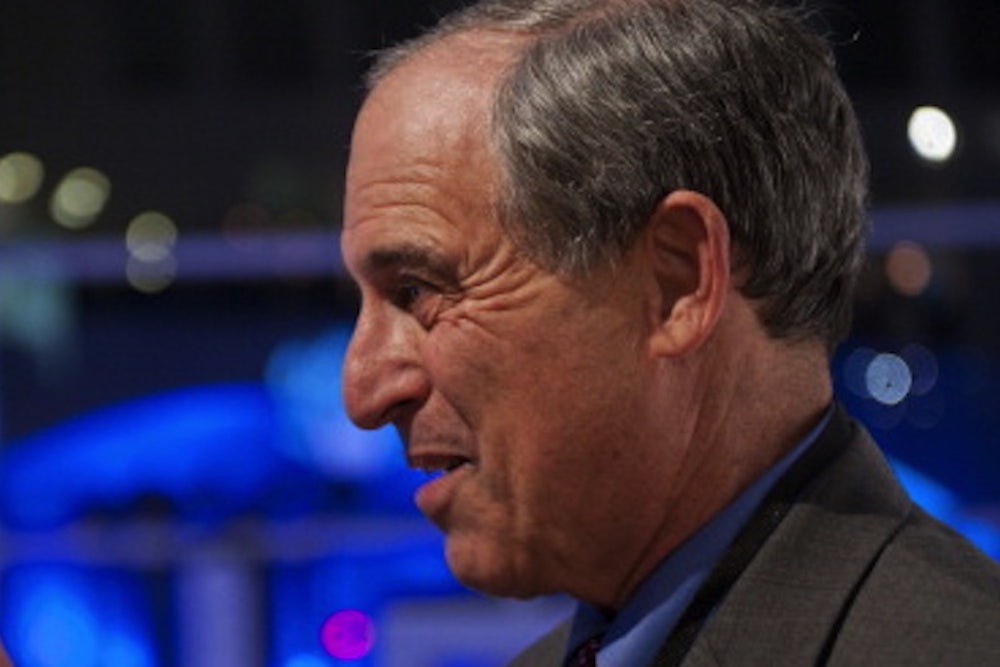In a big piece for The Washington Post, Paul Farhi has done his best to profile D.C. super-lawyer Lanny Davis. I say "done his best" because trying to keep abreast of Davis's absurdity and dishonesty is a job for a team of professionals rather than a single man (I speak from experience). Davis has made his name defending basically everyone and everything (Martha Stewart, Penn State). Most recently, his client of choice has been Washington Redskins owner Dan Snyder. (Apparently he has just agreed to work for Alex Rodriguez, too). Davis is fascinating as a creature of Washington, and Farhi nicely captures Davis's mix of insecurity and hyperactivity:
He volunteered a list of friends and colleagues who could speak about him. It contained 93 names. “I know,” he appended, “it’s excessive.”
Excess, however, is a Davis specialty. Specifically, his excessive love for dictators. I am thinking of two particular dictators, both of whom Davis represented. Farhi has a go at interrogating Davis over his unsavory clients, and Davis's answers are particularly interesting. As Farhi explains:
Democracy advocates were appalled when Davis accepted a $1 million contract in 2010 from Equatorial Guinea, a tiny, oil-rich African nation with a dreadful human rights record, and another for $100,000 per month from Ivory Coast a few months later.
Let's start with Equatorial Guinea. Here is Farhi's account, and Davis's response:
He went to work for Equatorial Guinea’s longtime dictator, Teodoro Obiang Nguema, on a promise that Obiang would initiate democratic reforms, he said. His principal contribution was writing a speech that Obiang gave at an international conference in South Africa that committed the country to admitting human rights monitors. Archbishop Desmond Tutu, the apartheid icon, later praised the speech. “The reason I’m so hypersensitive about it is because I’m really proud of what I did,” he says. “People distorted this by saying that I advocated for [Obiang], that I defended him, that I’ll do anything for money. That’s the charge that violates all of the deepest sensibilities of who I am.”
Yeah yeah. Let's turn to a New York Times report from 2010:
Mr. Davis said he advised Mr. Obiang that he would need to follow promises of reform with action — and invite journalists and civic groups to verify progress.
After Mr. Obiang left, a journalist asked Mr. Davis what would happen now to political prisoners. He replied, “If there are political prisoners and no substantive charges against them, they will be freed.”
"If there are?!" Here is Salon's description of an earlier State Department report on Obiang's rule, which was known for:
Unlawful killings by security forces; torture of detainees and prisoners by security forces; life-threatening conditions in prisons and detention facilities; official impunity; arbitrary arrest, detention and incommunicado detention; judicial corruption and lack of due process; restrictions on freedoms of speech, press, assembly, association and movement; government corruption; violence and discrimination against women; suspected trafficking in persons; discrimination against ethnic minorities; and restrictions on labor rights.
Salon went on to report that Davis kept representing his client long after it became clear that Obiang had zero interest in reform. Poor Davis: played for the fool. One hopes that the dirty money he was making helped mitigate the embarrassment.
Now to the Ivory Coast. Farhi writes:
The Ivory Coast story is a bit more complicated. Davis says he took on the assignment at the behest of the Ivorian Embassy in Washington, not the country’s then-president, Laurent Gbagbo. At the time, Gbagbo had lost his reelection bid but was refusing to relinquish power, claiming widespread voter fraud. The United States and other nations urged Gbagbo to step down after the stalemate set off a surge of violence in Ivory Coast.
This is a strange distinction to make: after all, who controlled the embassy? Here, again, is Farhi:
Davis said he advised the embassy that Gbagbo had to leave immediately. Publicly, he said otherwise. In a news release Davis issued just after he was hired, he said, “I urge the international community to avoid a rush to judgment until all the facts regarding the November 28 election are fairly evaluated — a position that offers the best chance to avoid bloodshed and to achieve peace and stability.”
Weasely, yes. But Farhi doesn't even quote a much more grotesque statement from Davis, who described his role as being to “present the facts and the law as to why there is substantial documentary evidence that President Laurent Gbagbo is the duly elected president as a result of the Nov. 28 elections.” So how does Davis explain it all? It turns out he was on a "secret" mission!
Davis says he couldn’t tell the media about this “undercover” role, lest it jeopardize the State Department’s attempts to find a peaceful resolution. (Gbagbo was subsequently arrested and faces charges of crimes against humanity at the International Criminal Court in The Hague.) “One thing I learned is never, ever mislead the press,” Davis says. “I spent a week misleading every reporter about what I was doing. I had the naive belief that this would be easy to accomplish, it would all work out and I would have served a good cause. . . . I was more than naive. I was stupid.”
In hindsight, Davis says he should have said no to Equatorial Guinea and Ivory Coast when they first approached him. “Did I make a misjudgment? Yes,” he says. “But were my motives correct in terms of really wanting to do good?” He answers the question himself: yes.
Davis was really just doing charity work. Admittedly, however, Davis's charity work is different than the charity work done by most people in two distinct ways:
1. Most people do charity for free
2. Most people's charity work doesn't accidentally empower dictators.
But then again, Davis has always been special.
